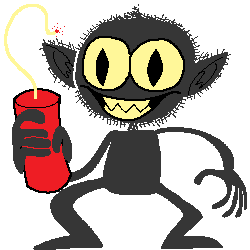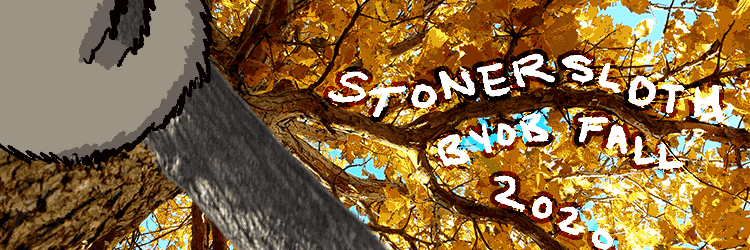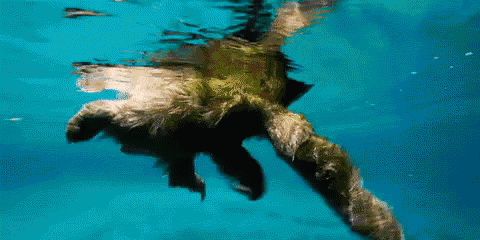|
|
*sits down backwards on the chair to look cool* I warned you before, you told me I shall post a nerdy  effort post effort post  about brains, their minds and cognition, so now let's roll up our sleeves and do this. about brains, their minds and cognition, so now let's roll up our sleeves and do this.So, we had this little talk in Ant Crew a while ago and also in the cat thread and I think like three times elsewhere about stuff I do for a living (it's writing words as you may have assumed already) and I always said that I might consider writing a boring rear end effort thread about this at some point and since you kept asking, here goes nothing. Let's talk about this:  It's a frog for the wednesday thread actually. What I mean is brains, more specifically, the mind that probably/maybe/actually we don't know at all sits inside. Most people would suspect that this defines you as you and that you think freely with it, but actually there are certain patterns and kinds of behavior that you do regularly and automatically without even thinking about it ever, many of which you are actually incapable of realizing. I'll get to that. Since this is BYOB, I'll try to keep this somewhat entertaining though and let's take a first, easy look, at this guy right here:  That's Alwin, he used to be my dog, although I don't live with him no longer and just happen to visit him every now and then. You happen to have a dog? Or maybe a cat? Or maybe other pets? Did you post their pictures in byob already? Because if not, do so right now, we want them all. A more on topic question though is this: Does your pet have a name? Of course it does, but ask yourself this: Why? The concept of naming another living being is something special that due to lack of language we only clearly observe in humans. We give each other names, we give our pets names, we give everything around us names, more or less arbitrarily. Every noun you know is nothing but a name we at some point decided to assign to that object or situation. The object doesn't care. Actually, other animals than humans also do not seem to care either. Yet, for us, a name for a living being is not just the description we use to form our language, it's something we assign to them specifically, to this one individual being. This is a special thing and you might not realize how special this is. We have barely any evidence (with a few and somewhat unclear exceptions for some birds and very few mammals like dolphins) that any other animal on this earth does this to any kind of extend. What I am talking about is translocating a subject into an external object due to interpretation of perceptive properties. We give each other names, because we give ourselves names and when we see another human, we instantly assume that he also does have a name to refer to himself. In fact, even imagining that this wasn't the case for someone else is immediately weird and fuel for fantasies, like when Game of Thrones picked that up with their take on the faceless men who deny having any kind of identity to assume different roles along with magical masks that are made for "no one". These no ones though do exist, everywhere around us actually and if you do have a dog that happens to be nearby, you probably can look at one of those right now, too. Dogs don't seem to give each other names, they merely recognize each other by smelling each other's butts (a technique I'd love to see established for humans if you ask me) and partly due to their appearances plus what you sound like, however they do not seem to care what you call them or what you call another dog either. The reason he reacts to the name you've given them is because you conditioned him to follow up with a certain kind of behavior upon hearing his name - for them it'ss like saying "Hey, look at me!" or "Come here!", depending on what their reaction is. Another possible explanation is that he does in fact not understand the command you just have him at all and merely looks at you to find out what you want. This can easily be confirmed by changing your dog's name - give it some time, and he will react exactly the same as he does now, something we do regularly when dogs change owners. You can even change it back afterwards, he'll remember it in no time with the same result as usual. Even multiple names work out fine! This does in no way suggest that your dog doesn't have a personality and special character properties that define him; the apparent fact that a specific name doesn't apply to your dog is simply due to the fact that the concept of naming oneself is foreign to most animals. You do not need a name for something, when you do not need a name for anything. Obviously, you might say, this is because dogs simply don't have any language, which is true. However that suggests that dogs couldn't differentiate between other objects just due to the lack of language, which is obviously not the case - they are not only very capable of understanding their surroundings, they are also able to differentiate between other dogs, humans, even specific plants, even if they look and smell exactly the same. The difference here lies in grasping your surroundings and grasping yourself. We make up names for each other because we are individuals who refer to each other individually. We are not only aware of our surroundings, but we are aware of ourselves and to grasp the concept of the latter, we need names. We know what we look like, we know what we smell like and we know when we look into our own eyes using a mirror (that mirror test is a common experiment in animal cognition and I'll get to that in another post in detail) and we transport this concept of individuality not only into other humans, but also entirely different animals, plants and sometimes even objects. Doing so doesn't change much for the object or living being we refer to, but it reveals something about ourselves and how focused we are on projecting our own way of thinking into our own surroundings, even though we may have no clue if that comes even close to the truth. It happens naturally the moment we perceive each other and is a normal part of our interpretation of our surroundings. This kind of constructing our reality inside our mind to then project our mind into that reality afterwards by interpreting our own perception is a vital part of how humans think and act and it's the very basis of what I want to get into in this thread. Now give your pet a healthy belly rub!! Except if it's a cat and it doesn't like that, in that case, uhm, probably run, cats tend to be vengeful, like, lying on your lap until your starve or somehow taking up all the space of your bed.
|
|
|
|

|
| # ? May 5, 2024 10:50 |
|
|
As a quick follow-up due to the stuff above and probably most of this being controversial, subject of current research, or stuff that other schools of philosophy might not like, feel free to disagree with everything I say here! Most of this is still fresh, hardly researched, contested from various other studies, seems counter-intuitive or even seems to battle with theological concepts. Neither of this is my goal here, both me, my colleagues and everything we do might be wrong or up for discussion from another perspective. This stuff being quite controversial is more or less natural at this point and I do not want to appear like I try to force anything onto anyone and especially I do not want to insult your pets or their brains, I love them all and actually post them all, right now.
|
|
|
|
|
i love brains and i'm not ashamed to admit that i love my brain it has many automatic reactions however through self therapy i have come to have a measure of self control it has many delusional thoughts however through reality checks both internal and external i live in this strange world with a semblance of calmness weed can be good for brains but also bad if you overindulge think responsibly
|
|
|
Goons Are Great posted:
While Mr. Dick doesn't have any grounds to contend the point you're making, that particular example is questionable because an easy counter for it is how many nom-de-plums or nom-de-crimes we can maintain. Humans can do the same trick but do it for demonstrably different reasons than the hypothesized reason you give for dogs doing it. The example demonstrates a shared ability to adopt and maintain multiple aliases. Using it as evidence as to how a being experiences the world, or particularly itself within that world, seems kinda junk. Mr. Dick doesn't know what would satisfy him as far as experimental evidence. He's not real sure any kind of phenomenological project, stripping subjective experience down to a bare frame of objectiveish reference, has legs. Removing anthropomorphism from stuff is itself anthropomorphist. ---------------- |
|
|
|
| I read all of these posts and I am still confused about what you do and what the relationship between what you do and what you've written is. | |
|
|
|
I will say though I think the discussion of naming appears to me to end up being a derail of what you actually want to talk about. It's a derail rather than an example because in the course of explaining it, you make a number of assertions that are highly questionable and also -- if I am understanding correctly -- irrelevant to the point you are trying to make, which is about a relationship between the perceiving subject and the objects of that subject's perception. Or maybe I am wrong. I had a cognitive science professor who would listen to me talking about my ideas during office hours and when I was done she'd say "ok, so what's the thesis?" and I'd have to explain myself all over again and then she'd say "ok, so what's the thesis?" and this would go on until I finally nailed things down to like one or two sentences. My perception is that names are not part of your thesis. Is that right? |
|
|
|
|
|
Mr. Dick posted:While Mr. Dick doesn't have any grounds to contend the point you're making, that particular example is questionable because an easy counter for it is how many nom-de-plums or nom-de-crimes we can maintain. Humans can do the same trick but do it for demonstrably different reasons than the hypothesized reason you give for dogs doing it. The example demonstrates a shared ability to adopt and maintain multiple aliases. Using it as evidence as to how a being experiences the world, or particularly itself within that world, seems kinda junk. That's a fine point! I wasn't really trying to deep dive into animal cognition in the op already, so I mainly used it as an easy to go way to prove the point that it doesn't really seem to matter for a dog - obviously though there is a lot more to this that is simply more or less entirely unprovable as we cannot know for sure what's happening in a dog's mind and will just start assuming stuff based on how they react to certain situations, however yes, you're right that standing as it is this is merely more than a rhetorical addendum of which you cannot build a phenomenogical concept on. I'll try to expand this in a later post with some actual experiments that happened in animal psychological frames. cda posted:I will say though I think the discussion of naming appears to me to end up being a derail of what you actually want to talk about. It's a derail rather than an example because in the course of explaining it, you make a number of assertions that are highly questionable and also -- if I am understanding correctly -- irrelevant to the point you are trying to make, which is about a relationship between the perceiving subject and the objects of that subject's perception. Or maybe I am wrong. You're entirely right. The reason I went with the naming complex is because it was one of the short talks we had in another thread, where the question came up whether or not our pets would understand their own name as a way to refer to themselves and thus react when we call them, or if it's a conditional thing just like other things we tell them to do. I used this as a starting point to get into the topic in an approachable way, as it's something we can relate to in every day life, but of course the sheer existence of a specific verbal expression doesn't translate into a window to check out the internal structure of a mind. The actual question behind this is hardly at all related to the act of naming things (especially as this comes along with a ton of basic philosophical problems, like assuming we'd be bound to a language to think etc), but more about asking "What does a dog think of himself?" which obviously quickly evolves into "What does one think of oneself?" as a general question regarding the ability of the subject to ask about its own properties and if non-humans do this as well. The initial thesis to this (and the usual answer you get when you ask someone about it) is no, hence my questionable assertions above where I more or less randomly claim this, however I'll provide some examples later that seems to counter this thesis as well. My goal here is to raise some questions that may get you into thinking about it, not represent my own opinions. I find it fun to think about what's going on in other minds in cognitive science and epistemology (that are the things I do btw), so I hope you guys can get into it with me for a bit. Also I'd love to hear those ideas, if you want to share! I do agree that some of those professors are a piece of work on their own.
|
|
|
|
Somewhere in the Void, a brain in a jar of liquid sits quietly, helpless... immobile. For now. Soon, it will pervade another biosuit amongst the cosmos,a planetary system will come within range of the spacetime the brainjar occupies, and when it does the consciousness will leap, and it will once again enjoy sentience with mobility, perhaps it will seek out the carnal pleasures of its host, perhaps it will bring the host's people to a new pinnacle of consciousness and usher in a Golden Age of technology, and also ensuring itself a new host to occupy in the far future, should their paths cross. For the time being, the brainjar must wait. It was always this way, as was agreed upon when the universe was new. The eons rolled by... |
|
|
|
Michel Gheslin has a lot to say about the act of naming, natural kinds vs. evolutionary individuals. That's about all I know about this area of philosophy. Very cool OP
OMGVBFLOL posted:if you have the money and the patience, you can Hello Kitty anything   Thank you deep dish peat moss! |
|
|
|
|
|
I like being devastatingly parsimonious when it comes to cognitive capacities across species and assuming the vast majority of heavy lifting when it comes to theories of human cognition comes from us pretending we are being far more clever than our actual behaviour would show
|
|
|
|
|
humans and animals may have divergent thought processes but as metaphors they are perfect and go deeper than you might expect
|
|
|
|
great thread idea and really interesting read op i would ask you why my dog gets excited if i say one of his dog friend names that he really likes and not so excited when i say a dog friend's name that he's not as fond of |
|
|
|
|
Luvcow posted:great thread idea and really interesting read op because your dog remembers one name as a word associated with a positive and socially rewarding experience
|
|
|
|
|
nut posted:because your dog remembers one name as a word associated with a positive and socially rewarding experience this
|
|
|
|
|
i'm gonna be honest op i am too mentally exhausted lately to read your entire post but i will get to it one day as it's gotten such polarising reactions
|
|
|
|
nut posted:because your dog remembers one name as a word associated with a positive and socially rewarding experience he also knows which toy to get if you ask him to get one, he knows people and place names, food names etc. |
|
|
|
|
i think it's been proven that dogs are great at word recognition. hence the ability to train them
|
|
|
|
|
Luvcow posted:he also knows which toy to get if you ask him to get one, he knows people and place names, food names etc. you also know which you to get if I ask you to get one, luvcow my investigation is complete you are a dog congrats
|
|
|
|
Our parakeets never learned to talk but they imitate our farts constantly. We walk by and they blow fart noises at us and at night they quietly fart at each other. I feel like they have truly grasped what it is to live with humans. |
|
|
|
|
GODSPEED JOHN GLENN posted:Our parakeets never learned to talk but they imitate our farts constantly. We walk by and they blow fart noises at us and at night they quietly fart at each other. I feel like they have truly grasped what it is to live with humans. Lol ---------------- |
|
|
|
nut posted:you also know which you to get if I ask you to get one, luvcow my investigation is complete you are a dog congrats woof |
|
|
|
|
luvdog
|
|
|
|
nut posted:luvdog |
|
|
|
|
admittedly, itís just as fun to assume the opposite that all animals have comprehensive but different understandings of conspecifics and maybe itís the big dream we go with on this day of giving
|
|
|
|
|
Luvcow posted:great thread idea and really interesting read op That's a super exciting question and I can spoiler you, that there is no definitive answer here, as we do not really know and reading a dog's mind is difficult in general. Sure, their ability to recognize words in structure, tonality and as an expression is obviously quite great, disregarding the question of why that is so in the first place (which is another exciting field actually), it is entirely possible that he just learned that if you say X, you refer to object/concept Y, resulting in his reaction Z. However, what leads to Z is where it gets funky, as we have to ask: What's his thought process behind hearing the name? Does he immediately understand the expression, connects it with his mental image of what it refers to and is also able to remember accordingly, resulting in him understanding that you are talking about another dog which then leads to the reaction? Does he merely interpret your tonality and the circumstances he is currently in and just assumes that it is something good? Or are you on any direct or indirect way to transport your own thoughts about that dog or object to him and he learned to read that? When it comes to animal language in general, there is an important difference between what they are capable of learning regularly (which means by imitation, connecting what happens around them into knowledge they can use again later) and learning on an abstract way (meaning being taught that something can happen despite it not happening right now). When it comes to other dog's names, it might as well be that they just connect their name to "that one dog" and "that other dog" resulting in the reaction and they do not really have a mental image of what personality in particular you are talking about, as it's merely descriptive and bound to what they learned while being with said dog, separating both words by how you pronounce them. Human language is almost always entirely arbitrary, as the words we use usually have no actual connection to the thing we describe with it. The word "egg" has nothing to do with the object a bird sits on, which, along with language displacement (talking about stuff that isn't part of your perception right now) directly contradicts the usual patterns animals use to learn things. You cannot teach a dog the concept of his toy just by talking to him about it, but you can excellently teach him about that toy when you have it in front of his eyes, say the word and this way teach him what it means. So there seems to be a difference between how we use language and how they use language, despite their undeniable ability to connect a word to another object or even another dog. Whether or not they are able to actually understand what you are saying there is very difficult, but so far we have very few (but some! It's not a clear thing) hints that they do connect the memory of something or someone to a specific word and understand their meaning on a more than basic level. To get further into that, I'd like to write a bigger post in a bit about animal languages in general, including exploring the stunning ability of apes to learn sign language, parrots talking about stuff all day long and why our language in general is apparently more than just grunts we happen to do with our throat, although sometimes it is. GODSPEED JOHN GLENN posted:Our parakeets never learned to talk but they imitate our farts constantly. We walk by and they blow fart noises at us and at night they quietly fart at each other. I feel like they have truly grasped what it is to live with humans. lol
|
|
|
|
|
quote:Dogs don't seem to give each other names, they merely recognize each other by smelling each other's butts (a technique I'd love to see established for humans if you ask me) and partly due to their appearances plus what you sound like, however they do not seem to care what you call them or what you call another dog either. The reason he reacts to the name you've given them is because you conditioned him to follow up with a certain kind of behavior upon hearing his name - for them it'ss like saying "Hey, look at me!" or "Come here!", depending on what their reaction is. Another possible explanation is that he does in fact not understand the command you just have him at all and merely looks at you to find out what you want. Fun fact: all three of our dogs picked their own name. We legit sat them down and called out a bunch of names, and they kept the one that they responded to. When the other two were alive and they were in a pack, they would respond only to individual names, and if you called one the wrong name their ears would move in a specific way and their tail would stop wagging, which was the same way they communicated "no I don't want to do that". I grew up with them and had a lot of time to observe them communicating between themselves. They had a reasonably complex system of communication depending on body language, some of the signals they would give each other (like "no I don't want to play", "stop doing that") were only about a fraction of a second, but the response and communication was pretty clear. When I was older I tried to mimic these, and occasionally I would get it right and other times I wouldn't. I realised that the difference was my eye placement and part of my posture. This reminded me about how some people claim dogs don't have the ability to construct models of how other animals act (iirc the term is theory of mind??). I have a direct experience that conflicts with that. Two of our dogs (the eldest and the... middlest? ig) were vying for attention/cuddles from one of my parents. The one was getting the cuddles because my parent had already given the other one time. The eldest went a couple of paces towards their bed, and tossed about a noisy toy a couple of times (the middlest's favourite toy). The middlest heard it, and got distracted and ran off to play with the toy. Immediately, the eldest dropped the toy, and ran over to get cuddles. That whole event is incredibly complex, if you dig into it. Constructing the plan in the first place involves prediction of what the other dog is going to do, figuring out which toy to elicit the response (she could have chosen a toy that wasn't noisy, or a toy that wasn't the other's favourite -- she clearly had a knowledge that the other dog had preferences regarding her toy) is a v complex activity. I don't think people give dogs enough credit and the current tests I've seen use breeds that are bred for dependency on humans, and are literally hell isolating random variables that could affect the outcome (Almost all of the ones I've read have v obvious flaws that they didn't meaningfully account for or explain why they didn't bother to do that). alexandriao fucked around with this message at 00:20 on Dec 26, 2019 |
|
|
Those Cartesian homunculii sure are good at applying signage to objects in perception. Here's Mr. Dick's 
---------------- |
|
|
|
Mr. Dick posted:Those Cartesian homunculii sure are good at applying signage to objects in perception. Here's Mr. Dick's
|
|
|
|
|
|
Sorry for letting this thread down, I was surprisingly busy and hardly know why. alexandriao posted:Fun fact: all three of our dogs picked their own name. We legit sat them down and called out a bunch of names, and they kept the one that they responded to. When the other two were alive and they were in a pack, they would respond only to individual names, and if you called one the wrong name their ears would move in a specific way and their tail would stop wagging, which was the same way they communicated "no I don't want to do that". I grew up with them and had a lot of time to observe them communicating between themselves. They had a reasonably complex system of communication depending on body language, some of the signals they would give each other (like "no I don't want to play", "stop doing that") were only about a fraction of a second, but the response and communication was pretty clear. When I was older I tried to mimic these, and occasionally I would get it right and other times I wouldn't. I realised that the difference was my eye placement and part of my posture. That's super cool! There are tons of fun examples of dog powers like that and that's super exciting. The theory of mind is a model where we ask what someone knows about someone else's ability to know things and specifically, what they actually know. For example, if you see me looking at a clock, you are able to assume that I know the current time - that's ToM. A dog's ability to predict certain things to happen and how others act is something else, but can sometimes be deeply connected to ToM. Simply said, it's easier to find out what's going to happen versus finding out what someone else knows, and by far easier to find out based on tests. In terms of credit, that's something that often comes up quickly and an important thing to note: When we assume that an animal does not seem to be able to do something we humans are able to do in cognitive science, that is not assuming that an animal is not intelligent, dumb or meant in negative a way towards said animal. We do not try to normatively assess an animal's cognitive abilities, we try to analyze how their mind might work, usually to also understand how our own mind works based on the difference. Intelligence has no general definition at all, especially not one everyone can agree to, and when we enter the exciting field of animal cognition it's impossible to "compare" a certain cognitive ability to the one of another species, because that might be entirely off-topic or even illogical. For example, observing that cats (as a biological family) are able to plan ahead, sneak around their prey in the darkness for many hours and attack in a pounce attack once they see the opportunity to strike is the one thing. Comparing it to the way wolves hunt is also fair game, given that they are working on a somewhat similar result and it's biologically related. However, assuming that cats are "smarter" than wolves because they do that vs. hunting down prey in a pack (which also is insanely complex and highly effective, also many cats do that as well but you know what I mean) is a wrong turn to take, because there are many biological and evolutionary reasons that wolves hunt differently than cats that in no way must be connected to their respective cognitive abilities to plan, think and act. The same goes when we compare another animal's behavior to a human's - we have largely differently structured brains, an entirely different body and history in how we use those, so of course we do different stuff. All lifeforms that exist today made it to this day without going extinct because they are insanely good at what they do, some have a rather "general" mind that's able to work with more specific situations than others that are rather specialized. When we ask about each other's minds (from a human perspective, of course, we are sadly unable to ever really change that) we try to find out how they might see the world and learn about ourselves in the process.
|
|
|
|
|
really enjoying this thread, i'll add to it but life is being super crazy and unchill at me at the moment - hopefully things will improve and I can throw in a couple of questions/anecdotes/etc to contribute but until then thanks GaG for making it!
|
|
|
|
Bringing this thread back from the grave to ask a very important question: Can cats actually tell the day of the week? I feel like most animals have at least a rudimentary grasp of the day/night cycle on account of the fact that most animals (to my limited knowledge) sleep. But do they have a concept of the days of the week? Obviously, I'm not going for full on anthropomorphization. I don't suspect for instance, that cat's have their own equally robust and concept-mediated language as humans do. But can they track statements such as "I'll give you catnip three days from now"?
|
|
|
| Paging Bwee to this thread | |
|
|
|
|
magic cactus posted:But can they track statements such as "I'll give you catnip three days from now"? In my experience, catnip is always a "right now" expectation. Fifteen years taking prescriptions |
|
|
|
|
magic cactus posted:Bringing this thread back from the grave to ask a very important question: Can cats actually tell the day of the week? I feel like most animals have at least a rudimentary grasp of the day/night cycle on account of the fact that most animals (to my limited knowledge) sleep. But do they have a concept of the days of the week? Obviously, I'm not going for full on anthropomorphization. I don't suspect for instance, that cat's have their own equally robust and concept-mediated language as humans do. But can they track statements such as "I'll give you catnip three days from now"? somewhat crazy bird lady marlene mccohen is convinced she can tell her parrots how long she is going to be away she tells them, "one time for bed, two times for bed, three times for bed, mommy's home!" her parrots understand all of these phrases, and (in theory) parrots can understand human numbers, so it is not outside the realm of possibility she is right in any event her channel is great if you like parrots, she has a very intuitive understanding of their psychology |
|
|
magic cactus posted:Bringing this thread back from the grave to ask a very important question: Can cats actually tell the day of the week? I feel like most animals have at least a rudimentary grasp of the day/night cycle on account of the fact that most animals (to my limited knowledge) sleep. But do they have a concept of the days of the week? Obviously, I'm not going for full on anthropomorphization. I don't suspect for instance, that cat's have their own equally robust and concept-mediated language as humans do. But can they track statements such as "I'll give you catnip three days from now"? Mr. Dick's going to hazard that "day of the week" is an almost entirely cultural, external. Without calendars and the need to use them, notions like "thursday" go out the window. Like, given agricultural, specifically cannabinoidal, and electrical self sufficiency, the human dude would outgrow this bizarre cultural fetish and the paraphernalia around it pretty quick. There's an objective and empirical basis for daily, seasonal and even lunar cycles, but Mr. Dick can't think of any any fact you can point to in the prehistorical world that would tell you what week it is, let alone what day of the week it is. OTOH, Mr. Dick wouldn't rule out the possibility of a cat being able to conceptualize something like that their slave is around all day to entertain their whims two consecutive days right before full moon, 1/4 moon after that, 1/4 moon after that, 1/4 moon after that, and repeat. Mr. Dick wouldn't rule out the ability to recognize a 2 day/ 5 day pattern not because of the calendar but because of its repercussions; things like traffic volumes, garbage collection routes, bells. ---------------- |
|
|
|
|
|
That's a super fun field we enter here, the magic of chronobiology. That's not just special because of how much we humans like to participate in measuring time, building cultural references around it and then structure our entire life around it. A few hours to the meeting, a few days to that new game, some months before a job, hell, even X years we probably have left to live. The interesting and especially magical part here is not just our cognitive understanding and our usage of time, but in realizing how insanely deep this goes. For a quick reference, check this link out where it was announced that the three biologists Rosbash, Young and Hall got the noble prize for their stunning revelation that even something as small as a single cell has incredible dependencies on time in 2017. Time is in general not just a thing we measure for convenience, it's of vital importance for evolution and the survival of a species. Knowing when to go to sleep in winter, when the rains will fall again so you can find fresh food during a drought, when to start looking for mates to procreate with, that's all something that many animals do and need, although we can't know for sure if they know when to do that based on an internal structure of time they actively think about or if they are reacting to signals their bodies gives them (as the cells, as has been proven, definitely are bound to certain cycles, usually in a more or less 24 hours rhythm). To think about that, you have to see what time frames are based on astronomy, nature in general and external, recurring events that show the time and which time frames are more or less made up by us based on cultural advancement. The answer is quite simple: One day, one month and one year is what "really exists", the entire rest, from seconds to weeks, we made up, as they have no natural base. A day is how long the Earth takes to spin, of course. A month (actually roughly 28 days) is how it takes for the moon to go through a full cycle and a year is the Earth moving around the sun. Additionally there are, apart from the rain forests, seasons that come and go along with these times that, depending on the geographical location, have immense impact on life. Assuming that we can't really "feel" a year come and go apart from seasons (which aren't as clear, they aren't everywhere and the northern and southern hemisphere have different ones), it's safe to assume that your cat (or at least his biological setup) has an understanding of days and, maybe, months. The latter is a maybe because while they usually like the night and thus encounter the moon a lot, weather can entirely screw that one up, so it's likely that the general biological rhythm is not bound to the likelihood of the moon shining bright - which however doesn't mean there couldn't be a more or less 30 day based rhythm happening anyways, just as it developed that way. When it comes to days and to the core of your question, there have been experiments with various animals, especially mice, in terms of how they behave when they cannot tell what time it is due to the lack of external signals in labs and they have shown a solid understanding to do certain things at a certain time anyways - the less information they get from outside, the more imprecise this becomes. Just as well as humans express vague feelings of what time it should be now, even in sensory deprivation situations; they usually are up to 12 hours off, but not entirely on the wrong end. This plus the by now medically proven fact that some things are based on the "feeling of time" for humans (eg certain medications work insanely better when taken in special time frames, even if you trick the person to think it's a different time of the day than jt actually is) leaves us to assume that we have a basic, cellular understanding of time passing, simply by the rhythms some of our biological functions are synchronized in. As other animals have shown the same way of reacting to certain medication and can be trained to do certain things after certain periods of time despite the lack of external signals to tell them about it, we have good reasons to assume that other animals and - there is research going back to the 40s for this - even plants, fungi and bacteria, are just as capable of "feeling time" as much as we are. It certainly is less precise than what we do with our many scales we use in between natural time scales, but assuming that measuring a certain time passing is something a highly developed and complex mammal like a cat couldn't do is something we have rather strong evidence against. So yeah, if you promise your cat a catnip in 3 days and don't deliver then (+- a bit) you can expect one or two assassination attempts and similar brutal vengeance!
|
|
|
|
|
fascinating as always friend! chronobiology always interested me if for no other reason than its connection to sleep. could it be that measuring time in terms of hours or even days is simply meaningless to some trees or fungi? perhaps measuring in terms of seasons is far more important? although that said there are certainly flowers that are accurate enough to make clocks out of! one thing that always interested me is the synchronous displays in the living world - cicadas or coral reefs where the coral all spawns at once
|
|
|
|
|
Stoner Sloth posted:could it be that measuring time in terms of hours or even days is simply meaningless to some trees or fungi? perhaps measuring in terms of seasons is far more important? this is a v cool thought. Trees still rely heavily on sun and the length of daylight tends to big the biggest entraining factor (or zeitgeber for our favourite german gag) for chronobiology. But I think something like fungi or maybe fish that live in a cave all the time would rely on something else that may not fluctuate so reliably on a daily basis. around the equator the length of daylight barely changes throughout the year and so a lot of animals there entrain to small temperature fluctuations or rain availability which is a wild way to think about living.
|
|
|
|
|
nut posted:the length of daylight tends to big the biggest entraining factor (or zeitgeber for our favourite german gag) for chronobiology. actually, this is probably a bad assertion. You can imagine that money for research is disproportionately located above or below the equatorial zone and do most of what we know is about temperate species because it's cheaper to go outside and study something than fly to another area. the number of species is usually highest around the equator and so daylight might actually not be the most common factor in guiding cyclic behaviour in animals, but just a product of the limits of our understanding
|
|
|
|

|
| # ? May 5, 2024 10:50 |
|
|
nut posted:this is a v cool thought. Trees still rely heavily on sun and the length of daylight tends to big the biggest entraining factor (or zeitgeber for our favourite german gag) for chronobiology. But I think something like fungi or maybe fish that live in a cave all the time would rely on something else that may not fluctuate so reliably on a daily basis. good points - also makes me wonder about some of the chemoautotrophic bacteria or archaea that live on deep sea vents or deep underground or bacteria that 'breathes' uranium or iron that gets all they need from rock - what strange time does a thing that lives entirely separate from the cycle of the sun keep?
|
|
|






















































